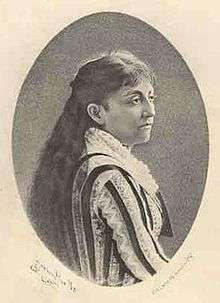Cecilia Arizti

Cecilia Arizti (or Cecilia Sobrino) (28 October 1856 – 30 June 1930) was a Cuban composer, pianist and music educator.
Biography
Cecilia Arizti was born on October 28, 1856 in Havana into a wealthy family with high social status, and this allowed her to freely pursue music. Her father, Fernando Arizti, was a musician who sponsored many well-attended music evenings at their home. Cecilia studied primarily with Nicolas Ruiz Espadero, one of the most expensive and well known music educators in her area, but also learned counterpoint from her father.
She was the first Cuban woman composer of chamber music, and she was a well known performer and teacher. Her works were nationally recognized, and she was published by notable New York based publishing houses Schirmer and A. Cortada.[1] She Died June 30, 1930 in Havana.
Music and Style
Arizti wrote a total of 22 works for piano, not all of which are readily available in the United States. She was also the author of a manual on piano technique. Her two Ave Maria‘s, as well as her Mazurka, were composed at the age of eight.
Aritzi was most notably influenced by the works of Chopin and Schumann. Harmonically, she made frequent use of chromaticism, secondary dominants and diminished chords as well as dissonance, pedal points and modulations typical of the early romantic era.
Arizti’s style was more restrained than that of her instructor Espadero, ignoring the virtuosity so prevalent at the time. Manuel Sanguily describes some of her compositions as “tender, almost drenched with tears, [while] others exhale an infinite melancholy.” [2] Her works are characterized by a strong subjectivism, which was a prevailing trait of the romantic movement in Cuba.[3][4]
Works
Arizti's works are for piano and composed in Romantic style. Selected works include:
- Impromptu in F minor
- Vals lent
- Romanza
- Nocturn
- Caprici
- Reverie, Op. 16
- Chamber Trio for piano, violin and cello
- Shinning Waltz
- Barcarola
- Mazurka
- Fantastic Dance
- Two Scherzo's
- Fantastic Dance
- Daily Piano Exercises (Piano Technique)
External links
References
- ↑ ""Cecilia Arizti Sobrino"". iawm.org. Retrieved 2017-05-09.
- ↑ Sanguily, Manuel. Hojas Literarias.
- ↑ Carpenter, Alejo. Music in Cuba. pp. Page 245.
- ↑ "Cecilia Arizti - EcuRed". www.ecured.cu (in Spanish). Retrieved 2017-05-09.